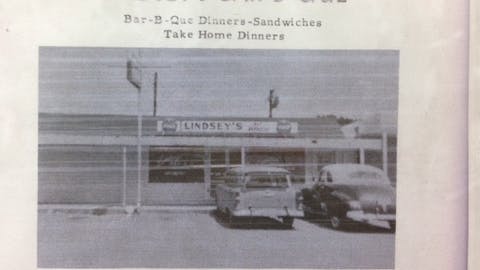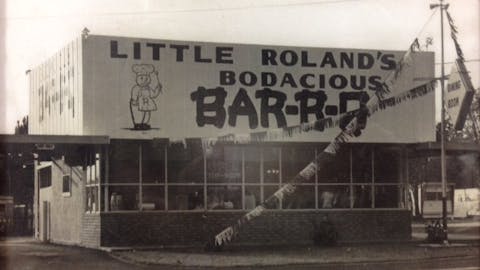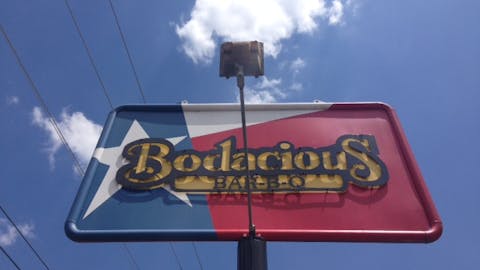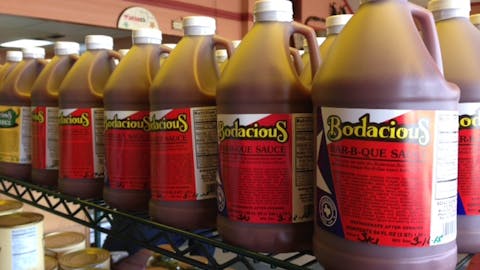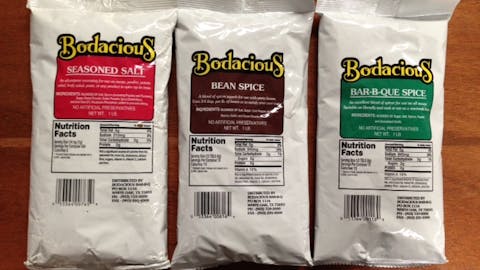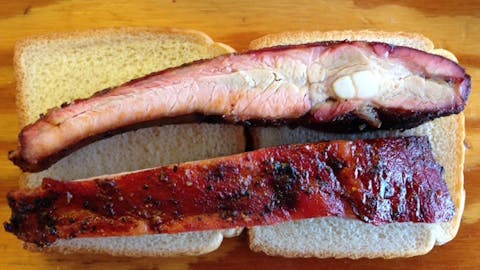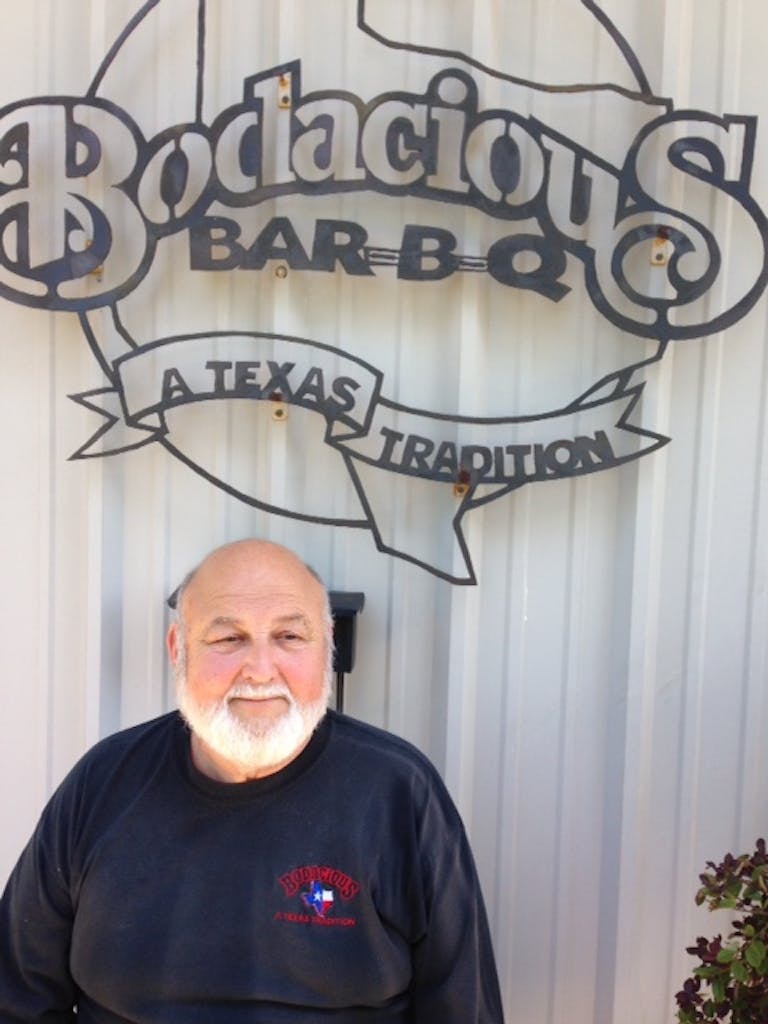 Founder: Bodacious Bar-B-Q; Opened 1968
Founder: Bodacious Bar-B-Q; Opened 1968
Age: 76
Smoker: Wood-fired Offset Smoker
Wood: Oak
Roland Lindsey went from running the pits for his dad in Dallas when he was fifteen, to running a chain of barbecue joints in (mostly) East Texas. He officially started Bodacious Bar-B-Q in Longview in 1968, and it has grown significantly since then.
Since it was first opened, the Mobberly location in Longview was where Roland did his best work. He hasn’t been in the best health recently, so the location now sits empty. Recently. Roland’s son-in-law Jordan Jackson quit his job at Stanley’s Famous Pit BBQ in Tyler to come work for the family. His hope is to re-open the Mobberly location, and do his part to up the barbecue game in East Texas. “I want to help bridge the gap between Jefferson and Tyler,” Jackson told me after the interview which he helped organize.
Roland and I talked in Bodacious’s facility west of Longview. They make the sauce and barbecue rubs here, and pack it for shipping out to all the stores. I learned plenty about Dallas barbecue history, the challenges of running a chain, and a fun bit of trivia. The famous rodeo bull Bodacious was named after the barbecue chain, and therfore the subsequent Primus song. See below for the video.
Daniel Vaughn: Where did the name Bodacious Bar-B-Q come from?
Roland Lindsey: Snuffy Smith. There was a fellow that had a newspaper. He was in business right next to me in Duncanville on Camp Wisdom and Main Street. He came up with that name. I fed him when he was struggling.
DV: What was it called before?
RL: Roland’s.
DV: Was that the first location in Duncanville?
RL: Yes. I had a little problem there in Dallas and couldn’t go to school. That’s how I got to Duncanville, anyway… I’m not proud of everything.
DV: Were you born in Dallas?
RL: Right there by Bewley’s shop there on Prairie and Haskell. I was born at the Florence Nightingale Clinic there.
DV: I’ve talked to Mr. Bewley. You knew him well, right?
RL: Oh yeah. I’ve bought eighty-seven pits from him.
DV: So there’s a good chance that if you go into a Bodacious, you’ll find a Bewley smoker?
RL: Yes, that or an Oyler.
DV: Was our dad into barbecue?
RL: Well, he had a café in Duncanville called Lindsey’s Bar-B-Que. He had two or three things going all the time. Delivering milk became my job before school.
DV: Did you start cooking barbecue at your dad’s café?
RL: Oh yeah. I started when I was about fifteen. He said “I think you’re the best barbecue man, maybe in the world.” I said, “dad, you can’t get anybody else to stay back there with this pit. You don’t have to tell me this stuff.” It had a brick pit about the size of this table. It had weights so the lid went up. The smoke was supposed to go out the end, but it just sorta came out everywhere.
DV: Did it have an offset firebox?
RL: No. You just threw the wood in the end. We had an old RC sign to put over it to slow it down.
DV: What was on the barbecue menu?
RL: We cooked beef clods. They weren’t fancy ones. They were real lean with a little gristle in them. We’d trim off all the edges, then slice it on the slicer, about 1/4” thick. We had what we called an Arkansas gravy, which was mostly water with a little sugar, salt, a little Worcestershire, and a little tomato sauce. You’d boil it and put a bay leaf in there. You put the sliced beef in the pan and pour it over top. All the edges you cut off would go into a bain-marie and keep cooking. That would be your chopped beef.
DV: There weren’t any ribs or anything else then?
RL: That’s right. At night you could eat all you want.
DV: What prompted you to leave your dad’s restaurant and go open up Roland’s?
RL: I wanted to get away from him [laughing]. He was the kind of guy that if somebody had a boxcar full of seed or sheetrock, he’d say “Baby Roland…” They called me Baby Roland back then. “Baby Roland will get that.” I tried to stay busy. He was a painter, and I couldn’t stand to paint, so if I stayed busy I wouldn’t have to paint.
DV: So you opened up your own spot?
RL: A guy rented me an A-frame building. It was tall and looked like a church. I built a pit inside of it. I didn’t work. It didn’t do anything but catch on fire, so I started cooking hamburgers. When I got drafted in the service, I rented it to two guys. They were going to sell hamburgers and barbecue. I wasn’t fit for duty because of my leg from paying ball. When I came back they were mad and got a lawyer. It was over for me there. I wasn’t going back to the service. I got into this little house on Camp Wisdom in 1960. We just cooked plates there.
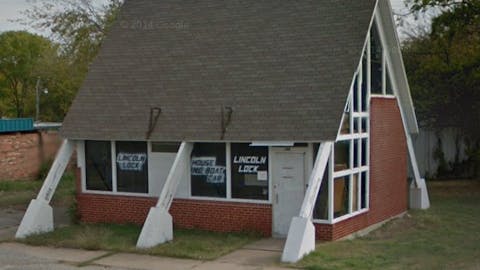
DV: Plates?
RL: You now. Beef plates. It’s the whole side with the ribs still on it. I didn’t see a brisket for years. They were on the [beef] plates that I bought. If you bought 100 lbs of it, it was $10. We chopped the meat up, we didn’t slice it. We got it from Neuhoff Bros, down where the West End is now.
DV: How did you cook it?
RL: I didn’t even have a refrigerator to put it in. I’d put it right on the pit, and I’d move it around. The pit was twenty feet long and six feet deep. No engineer built these. I had a huge fork, a pitchfork. You learn how to handle them. They were real durable. The bones were in there.
DV: Was it just you at the time?
RL: I had a guy work for me. I used one or two from the school. I’d pay them a little.
DV: What else was on the menu?
RL: We didn’t have a menu, but it was just beef and we had Rudolph’s sausage from Dallas.
DV: Did you season the beef with anything?
RL: Just the gravy. I made a sauce one time with chili sauce. It was a thick, chunky sauce, but the other one was my favorite. We’d use a mop to put the gravy on it. We’d serve it on white bread for a long time. In about 1964 I started to use buns. We’d put the beef and gravy on there. At the end of the day it would all get cooked down and get real rich. It was good.
DV: Did you eat other barbecue in Dallas back then?
RL: Yes, Shoemaker’s. I liked them. The reason I got into barbecue business was Sonny Bryan’s. I worked over at Central Freight Line next door. He had a brick pit. When they started selling briskets with bones in them, he’d use that. Then when they took the bones off, he’d cook the ones with the deckle still on it. I loved Sonny and his barbecue, but he had a thick sauce.
DV: Do you know the other Roland in Texas barbecue, Roland Dickey?
RL: When I was in second grade, their barbecue place was right there on 75. I went to Milam Elementary. I would go around and pick beer and Coke bottles up. I’d go into Dickey’s and sell them. One day one of the old men there said “You know, I’ve been buying your bottles from you, and you ain’t never bought nothing from me.” I said, “I don’t have any money, well not as much money as you do.” That was good barbecue.
DV: You did eventually buy some barbecue there?
RL: One sandwich. It ruined me. You know the guy who’s barbecue I always liked better than anybody’s was Sonny Bryan’s, but I’ve never tried Aaron Franklin’s. Jordan tells me it’s great. He showed me a still photo of the barbecue and his pits. Everybody wants to know his trick, but there ain’t no trick to that. That boy works his a– off.
DV: When did you close the place in Dallas?
RL: I sold it one day when I got married. A friend of mine came by and asked me to sell it. I said all right. He said “What do you want for it?” I told him $10,000, and he said “I’ll be back.” I got the papers ready, and sold it within the week. I had just gotten married.
DV: When did you add the name Bodacious?
RL: I had it on the sign out here [in Longview]. We came here from Commerce in 1967.
DV: What were you doing in Commerce?
RL: I went to finish school in Commerce to become a teacher. It was an easier life, I thought. I just fell into the barbecue business the same way.
DV: How do you just fall into it?
RL: I didn’t have name for it. It was right in the middle of town on Monroe. One of the professors owned it and I rented it. It was right across the street from 2200 girls in the sororities.
DV: Was it one of your professors?
RL: I never did go to school. I opened the barbecue place up while I was getting ready. It was the probably the best place I ever owned.
DV: Where’d you go after Commerce?
RL: Right over on Mobberly [in Longview]. That would have been 1968. It was a barbecue place before called Solly’s. They had one up in Dallas too. We called it Little Roland’s Bodacious Barbecue.
DV: Did the menu grow then?
RL: I didn’t start cooking ribs until then. Somewhere in the sixties, President Nixon screwed something up, so we couldn’t get much meat. I just sold that Rudolph’s sausage and Angelo-trim briskets. We had two Oylers at that time. We’d run them day and night.
DV: Once you had the Mobberly location established, what was the second one?
RL: Mount Pleasant. I almost owned Stanley’s in Tyler too. J. D. Stanley was the nicest guy. I went over to talk to him. I told him that I’d never be able to run it unless it was up to code. He said “Let me work on that.” He got in there and got it up to code. They slicked it up. I would have bought it, but he fell back in love with it.
DV: When did the process start that you began to sell Bodacious franchises?
RL: I never did sell them.
DV: Can anyone come to you and open one up?
RL: Well no. You have to work for Bodacious.
DV: How many are out there now?
RL: We make 38 stops out of the truck, but they’re not all Bodacious.
DV: Do you still work at any single location?
RL: Not anymore. I was at Mobberly [which is sitting idle]. I’ve had a little problem with cancer.
DV: That’s got to be a big change from cooking barbecue everyday to now be in more of a managerial positon?
RL: We’ve got some good guys, but if I did it again, I’d have let you come in and work a while, and good luck to you. [Having the franchises] puts a lot of sacrifices on your marriage and kids. There are sacrifices, but I’m not upset about it. I’m glad to be here.
DV: If you don’t sell the franchises, what do you get out of it?
RL: We get a percentage of the sales.
DV: And they buy their sauces and rubs from you?
RL: Yes.
DV: When did you add all of the rubs and sauces into your recipes?
RL: When we got out here [to Longview]. People would call me complaining about how sweet or how hot the barbecue sauce was at some of the different locations. One store at a time, we started making sauce for them. We’ve also got a brisket rub, a bean spice, and a barbecue rub.
DV: Do you have any standards for each location about the meat they purchase, the wood they use, or the smokers they run?
RL: They do whatever they want. One is red oak, and another likes the post oak.
DV: Since you don’t have Mobberly to eat at, do you have some locations you like to eat at?
RL: I like the ribs over in Marshall. I like the brisket at the state park location [on I-20]. They put sugar on it and they cook it slow.
DV: What’s the furthest one?
RL: San Angelo. That boy’s from Tyler.
DV: Do they get scared when you come by, or do you normally make deliveries?
RL: When I go a lot of times it’s because somebody is messing up. It’s usually dry meat.
DV: What’s the future of Bodacious Bar-B-Q? Are you looking to expand or just get better with the stores you have?
RL: Things are looking good. There’s a guy here affiliated with McAlister’s Deli. They have a lot of money, evidently. I told him “We sell five semi loads of barbecue spice every year, two hundred thousand pounds or so, and we’ve never asked anyone to buy a bag of it, and we’ve never advertised it.” Somebody needs to be here to pack it up and ship it out.
DV: Are you still enjoying barbecue?
RL: Yeah. I just wish I could still cook and run my own place.


